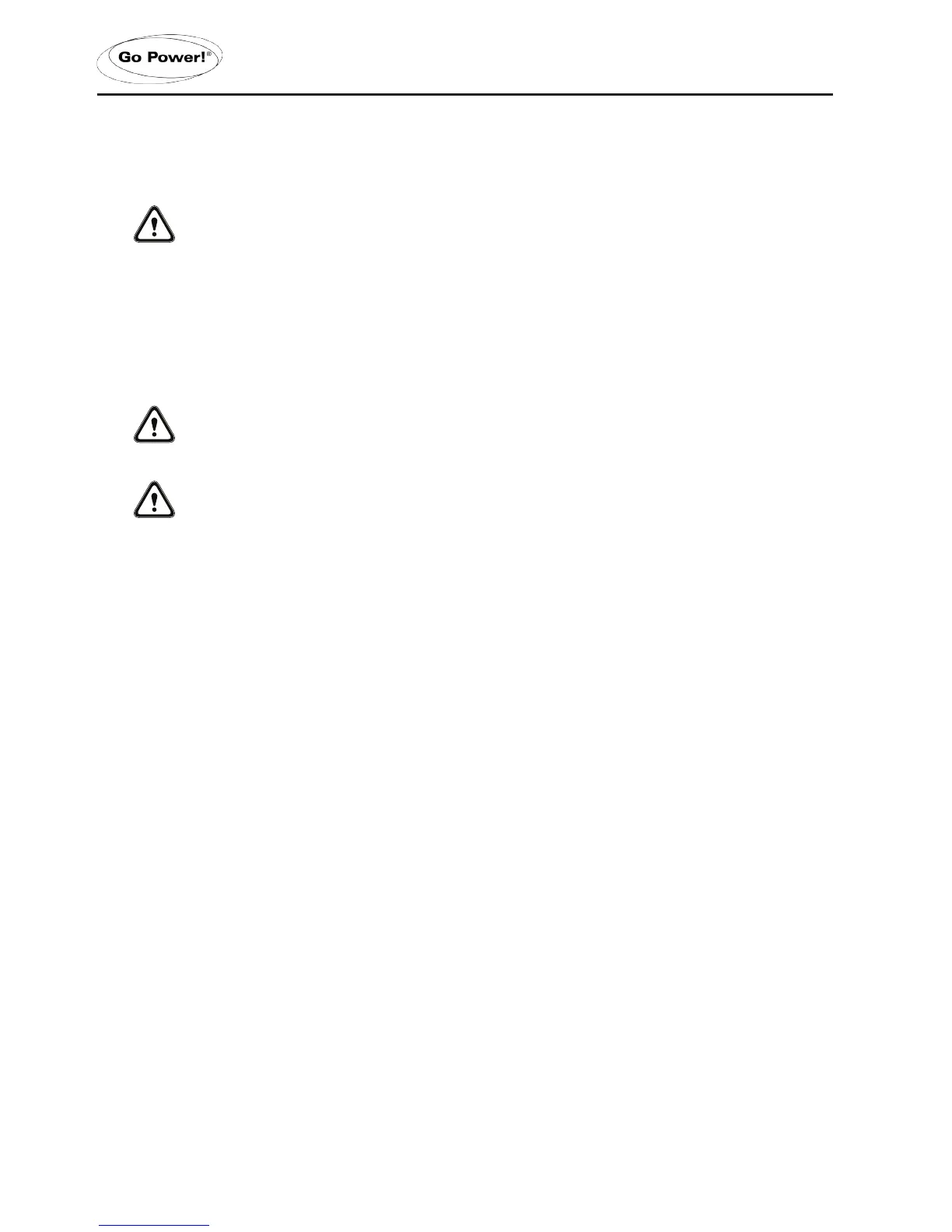[page 50] | gpelectric.com
SAVE THESE INTRUCTIONS: This manual contains important safety and operating procedures.
The IC Series Inverter/Chargers are Marine UL listed, and can be used in marine applications. Below are important safety and
operating instructions for using the IC Series in marine applications.
CAUTION! Personal Injury. To reduce risk of injury, charge only lead-acid type rechargeable batteries. Other types
of batteries may burst, causing personal injury and damage.
• Do not expose the IC Series Inverter/Chargers to rain or snow.
• UseofanattachmentnotrecommendedbyGoPower!mayresultinriskofre,electricshock,orinjurytopersons.
•
Do notdisassembleICSeriesInverter/Chargers;taketoaqualiedservicemanwhenserviceorrepairisrequired.Incorrect
reassemblymayresultinriskofelectricshockorre.
• To reduce risk of electric shock, disconnect all sources of power from the IC Series Inverter/Chargers before attempting any
maintenanceorcleaning.Turningocontrolswillnotreducethisrisk.
GROUNDING INSTRUCTIONS – This marine unit should be connected to a grounded, metal, permanent wiring system;
or an equipment-grounding conductor should be run with circuit conductors and connected to equipment-grounding
terminal or lead on unit. Connections to unit should comply with all local codes and ordinances.
Warning! Risk of Explosive Gases. Working in the vicinity of a lead-acid battery is dangerous. Batteries generate
explosive gases during normal battery operation. For this reason, it is of utmost importance that each time before
servicing the unit in the vicinity of the battery, you must read this manual and follow the instructions exactly.
To reduce risk of battery explosion, follow these instructions and those published by the battery manufacturer and
manufacturer of any unit you intend to use in vicinity of the battery. Review cautionary markings on these products
and on the engine.
PERSONAL PRECAUTIONS
• Someone should be within earshot or close enough to come to your aid when you work near a lead-acid battery.
• Have plenty of fresh water and soap nearby in case battery acid contacts skin, clothing, or eyes.
• Wear complete eye and clothing protection. Avoid touching eyes while working near a battery.
• If battery acid contacts skin or clothing, wash immediately with soap and water. If acid enters eye, immediately
usheyewithcoldrunningwaterforatleast10minutesandgetmedicalattentionimmediately.
• NEVERsmokeorallowasparkorametocomeinthevicinityofabatteryoranengine.
• Be extra cautious to reduce risk of dropping a metal tool onto a battery. It may spark or short-circuit the battery
or other electrical part that may cause explosion.
•
Remove personal metal items such as rings, bracelets, necklaces, and watches when working with a lead-acid
battery. A lead-acid battery can produce a short-circuit current high enough to weld a ring or the like to metal,
causing a severe burn.
• NEVER charge a frozen battery.
•
Ifnecessarytoremovethebatteryfromthevessel,alwaysremovegroundedterminalfrombatteryrst.Make
sureallaccessoriesinthevesselareturnedo,soasnottocauseanarc.
• Be sure area around battery is well ventilated.
• Clean battery terminals. Be careful to keep corrosion from coming in contact with eyes.
• Studyallbatterymanufacturers’specicprecautionssuchasremovingornotremovingcellcapswhilecharging
and recommended rates of charge.
•
Adddistilledwaterineachcelluntilbatteryacidreacheslevelspeciedbybatterymanufacturer.Thishelps
purgeexcessivegasfromcells.Donotoverll.Forabatterywithoutcellcaps,carefullyfollowmanufacturer’s
recharging instructions.
MARINE APPLICATION LOCATION
• Locate the Inverter/Charger away from the battery in a separate, well ventilated compartment.
• Never place the IC Series Inverter/Chargers directly above the battery; gases from battery will corrode and dam-
age marine unit.
• NeverallowbatteryacidtodripontheICSeriesInverter/Chargerswhenreadinggravityorllingbattery.
• Do not operate the IC Series Inverter/Chargers in a closed-in area or restrict ventilation in any way.
DC CONNECTION PRECAUTIONS
6. IMPORTANT SAFETY INSTRUCTIONS
